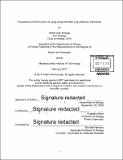Prevalence and prevention of large-scale somatic copy number alterations
Author(s)
Knouse, Kristin Ann
DownloadFull printable version (16.00Mb)
Other Contributors
Massachusetts Institute of Technology. Department of Biology.
Advisor
Angelika Amon.
Terms of use
Metadata
Show full item recordAbstract
Organismal viability is contingent upon the transmission of a balanced genome to the next generation. Genomic imbalance on the order of megabases, as occurs with sub-chromosome copy number variants (CNVs) or whole-chromosome aneuploidy, is almost always associated with embryonic lethality or severe disease. However, while large-scale genomic imbalance has adverse consequences at the organismal level, both CNVs and aneuploidy are widespread in cancer and also reported to be prevalent in select untransformed tissues. In order to reconcile these discrepant observations and understand how genomic imbalance influences disease, it is necessary to perform directed analyses of genomic stability in vivo. In this thesis, we first employ single cell sequencing to examine megabase-scale somatic copy number alterations in mammalian tissues. We find that the somatic copy alterations are indeed more prevalent than constitutional copy number alterations, but not nearly as prevalent as previously reported for some tissues. We then analyze chromosome segregation of somatic cells both in vivo and in vitro and discover that chromosome segregation in epithelia is not cell autonomous. We find that tissue architecture facilitates chromosome segregation in vivo and its disruption leads to chromosome instability. Finally, we turn to the increasingly available cancer genomics data to assess karyotypic changes both within and across cancer types and within individual tumors. We find strong evidence for karyotype optimization that is highly cell-type specific. Together, our results emphasize the importance of context, whether it be organism-wide or somatic, in vivo or in vitro, or a specific cell type, in the generation and consequences of genomic imbalance and highlight the importance of in vivo experimentation in which context is considered.
Description
Thesis: Ph. D., Massachusetts Institute of Technology, Department of Biology, 2017. Cataloged from PDF version of thesis. Includes bibliographical references.
Date issued
2017Department
Massachusetts Institute of Technology. Department of BiologyPublisher
Massachusetts Institute of Technology
Keywords
Biology.